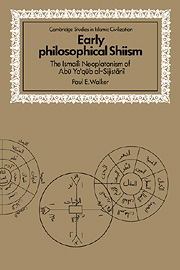Book contents
- Frontmatter
- Contents
- Preface
- Acknowledgments
- Note on transliteration
- List of abbreviations
- PART I AL-SIJISTĀNĪ'S HERITAGE
- PART II AL-SIJISTĀNĪ'S UNIVERSE
- 4 Introduction: categories of thought and terms of analysis
- 5 A theology of unqualified transcendence
- 6 Creation as command
- 7 Intellect, the sum of existent being
- 8 Descending and ascending soul
- 9 Nature and the physical realm
- 10 A cosmic anthropology
- 11 Prophecy, the deputy of intellect
- 12 Interpretation and its institution
- 13 Salvation and the womb of history
- EPILOGUE: THE USE AND CONTROL OF REASON
- Notes
- Select bibliography
- Index
6 - Creation as command
Published online by Cambridge University Press: 02 November 2009
- Frontmatter
- Contents
- Preface
- Acknowledgments
- Note on transliteration
- List of abbreviations
- PART I AL-SIJISTĀNĪ'S HERITAGE
- PART II AL-SIJISTĀNĪ'S UNIVERSE
- 4 Introduction: categories of thought and terms of analysis
- 5 A theology of unqualified transcendence
- 6 Creation as command
- 7 Intellect, the sum of existent being
- 8 Descending and ascending soul
- 9 Nature and the physical realm
- 10 A cosmic anthropology
- 11 Prophecy, the deputy of intellect
- 12 Interpretation and its institution
- 13 Salvation and the womb of history
- EPILOGUE: THE USE AND CONTROL OF REASON
- Notes
- Select bibliography
- Index
Summary
Having chosen a concept of tawḥīd that emphasizes the absolute nature of God's transcendence against any taint of immanence, al-Sijistānī turns to a second major area of controversy – that of creation. In one sense the problem of creation is itself a part of a doctrine of God, given that the solutions which were proposed in Greek philosophy had become unacceptable in creationist religion. The Greek notion that the cosmos is composed of two realms – the sensible and the intelligible – and that the subject of creation is merely what connects the one with the other fails to offer a place for a Creator God who stands totally outside the product of His creative activity. Where al-Sijistānī found an understanding of tawḥīd, in part based on a Neoplatonic God beyond being and knowability, his doctrine of creation must yet bring that God back into a correct, productive relationship with the universe He oversees. To do so al-Sijistānī must reintroduce ideas that largely, though perhaps not entirely, mitigate his advantage in the area of tawḥīd.
The philosophical division of reality into sensible and intelligible makes of the latter a world of permanence, purity and simplicity and of the former a realm of transition, corruption, and composition. This is al-Sijistānī's view as well, but for him the subject of creation extends beyond. Corporeal existence belongs exclusively to the realm of the senses which is the world of nature, the elements, form and matter.
- Type
- Chapter
- Information
- Early Philosophical ShiismThe Isma'ili Neoplatonism of Abu Ya'qub al-Sijistani, pp. 81 - 86Publisher: Cambridge University PressPrint publication year: 1993

